PLEASE NOTE:
While the following article relates to your Google search, the services and methods at Goodwin Hypnosis may differ from those mentioned below. Since 2007, we have helped thousands of clients to overcome emotional and behavioral challenges when all else had failed. According to many of them (and their referring healthcare providers), our methods are faster than talk therapy, easier than willpower, and safer than medication. If you’re ready to resolve your issues, skip the article and visit the rest of our website, where you can learn about our unique approach, watch client testimonial videos, and discover how working with us one-on-one could be the solution you’ve been searching for.
We can help you with a variety of issues relating to emotional trauma. While we don't diagnose disorders like PTSD, we have helped hundreds of clients to overcome a wide range of traumatic experiences and their negative effects with methods that are more efficient and comfortable than CBT or EMDR. If you would like to learn more about working with us one-on-one to clear your trauma, click here.
Introduction
Navigating the complexities of relationships affected by Post-Traumatic Stress Disorder (PTSD) can be a challenging journey for both partners. As individuals grapple with the emotional aftermath of trauma, they often find that communication, trust, and intimacy are significantly impacted. Understanding the nuances of PTSD is essential for fostering empathy and patience, allowing couples to support each other through their healing processes.
With over 40 million adults in the U.S. experiencing anxiety and stress, the need for effective coping strategies and professional support has never been more crucial. This article delves into the profound effects of PTSD on relationships, offering insights and strategies to rebuild trust, maintain healthy interactions, and prioritize self-care for both partners. By exploring alternative therapies and emphasizing the importance of open communication, couples can create a nurturing environment that fosters healing and deeper emotional connections.
Understanding the Impact of PTSD on Relationships
Post-Traumatic Stress Disorder (PTSD) can profoundly influence relationships, reshaping how individuals communicate, engage emotionally, and build trust. Those grappling with PTSD often experience heightened anxiety, feelings of numbness, or irritability, which can inadvertently lead to misunderstandings and conflict within their relationships.
Notably, anxiety is prevalent among American adults, with over 40 million affected, as many individuals seek alternatives to traditional therapies that may not meet their needs. According to the American Psychological Association’s 'Stress in America 2023: A nation recovering from collective trauma,' adults in the U.S. rated their average stress level as a five out of ten, with 24% rating their stress between eight and ten. This statistic emphasizes the psychological burdens that affect communication, particularly as women reported an average stress level of 5.3 compared to 4.8 for men, highlighting significant gender differences in stress levels.
Such dynamics create barriers to intimacy, as individuals may feel overwhelmed by trauma-related triggers. The survey found that women expressed a greater need for emotional support and reported feeling more consumed by financial worries, illustrating how PTSD can affect communication and emotional support needs in relationships.
Recognizing these patterns is essential for recovery; it allows both partners to approach one another with empathy and patience. By recognizing that behaviors resulting from PTSD are not personal attacks but rather responses influenced by distressing experiences, couples can create a supportive atmosphere conducive to recovery. This kind approach not only tackles communication challenges but also fosters trust and connection, paving the way for deeper recovery together.
Exploring alternative methods like hypnosis can also promote personal development and recovery, assisting individuals in uncovering and addressing the root causes of their anxiety and distress. As one Goodwin Hypnosis client, Gabriela, shared,
'After 5 sessions of hypnotherapy in 4 weeks with Todd, I can say that I have made more improvements with my anxiety in that short time than I had over the past 6 months.'
Another client, Ray, noted,
'Hypnosis therapy is a way to really re-program yourself and unlearn unwanted emotions and behaviors completely!'
These testimonials emphasize how hypnosis can specifically tackle the symptoms of PTSD, fostering a path towards recovery.
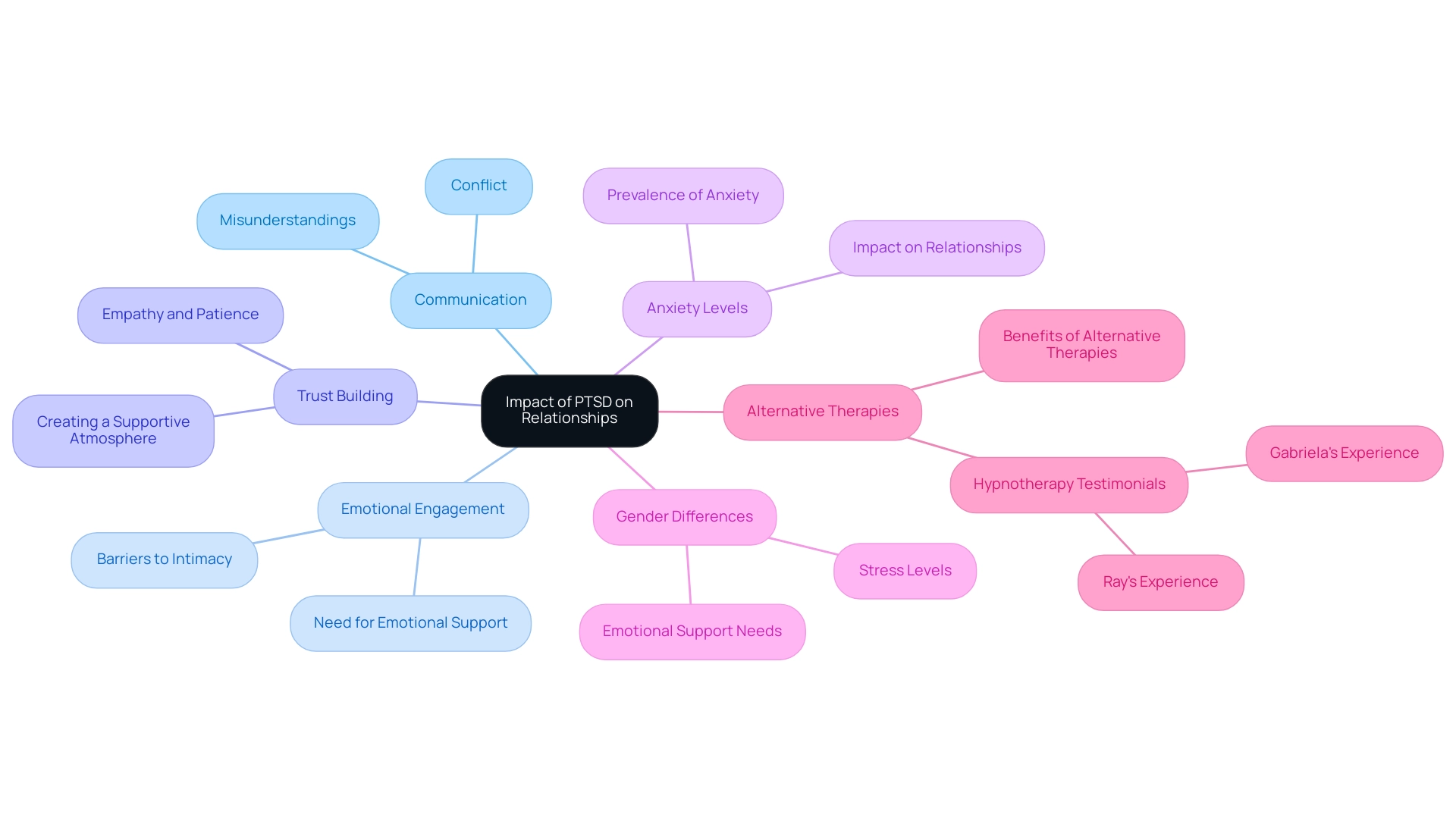
Strategies for Rebuilding Trust in PTSD-Affected Relationships
-
Open Communication: Our online emotional recovery program establishes a secure environment for both individuals, crucial for healing. It's important to encourage each other to express feelings and fears without the fear of judgment. Utilize 'I' statements to convey personal emotions; this approach fosters understanding rather than blame, which is crucial in navigating the complexities of PTSD. For instance, studies show that effective communication can improve relationship satisfaction by up to 70% in couples dealing with PTSD. Moreover, many clients have found that participating in our program, which utilizes hypnosis and NLP, enhances their ability to communicate openly and heal together.
-
Set Boundaries: Clearly defining acceptable behaviors within the relationship is vital. This practice fosters a sense of security and respect, enabling both individuals to feel valued and understood. Research indicates that couples who establish healthy boundaries report a 60% increase in trust levels over time. Clients who have engaged with our resolution techniques often express newfound clarity in setting boundaries, significantly improving their relationships.
Consistency: Reliability in actions and words is key to rebuilding trust. When both partners are consistent, it nurtures a sense of safety and predictability that can ease anxieties stemming from trauma. According to the case study titled 'Rebuilding Trust in a Relationship Affected by PTSD,' consistent actions helped the couple achieve a significant reduction in anxiety and an improvement in their relationship dynamic. Clients like Amber have shared how our sessions with board certified hypnotists Todd and Gina Goodwin have helped them establish consistency in their interactions, leading to noticeable relationship improvements.
- Patience: Recognizing that the journey to rebuild trust takes time is essential. Celebrate small victories along the way and approach setbacks with compassion, recognizing that recovery is not linear. Couples who practice patience in their recovery process often see a 50% higher success rate in rebuilding trust. Through our one-on-one online programs, many have reported that the patient approach of hypnosis and NLP has made their recovery journeys feel more manageable and supportive.
Affirmations of Care: Regular expressions of love and commitment to the relationship strengthen personal bonds. Affirmations of care not only strengthen connections but also support the healing process, reminding both individuals of their shared journey. A study found that couples who regularly express affirmations report a 65% increase in relationship satisfaction.
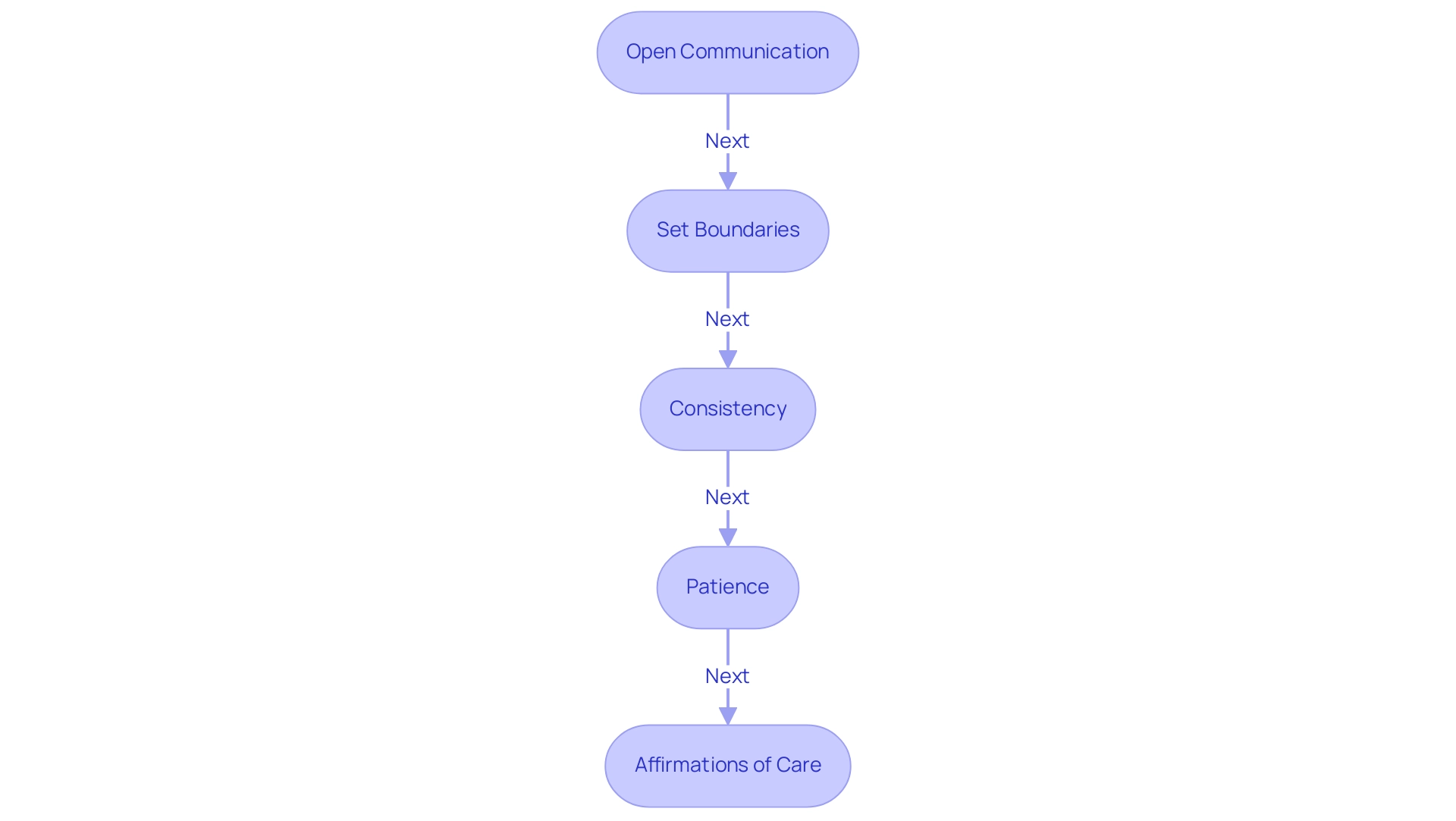
Coping with Triggers: Maintaining Healthy Interactions
-
Identify Triggers: Begin by gently collaborating to pinpoint specific triggers that may cause distress for you or your significant other. These can manifest as certain words, situations, or even particular times of the day that evoke strong feelings. Comprehending these triggers is crucial in establishing a secure environment for both partners, particularly for those addressing past experiences through techniques like hypnosis and NLP.
-
Develop Coping Strategies: Collaborate to create a personalized list of coping mechanisms that can be employed when triggers arise. Techniques such as deep breathing, taking a brief timeout, or engaging in grounding exercises can help in moments of distress, allowing for a more measured response. As Stacy Mosel, L.M.S.W., a substance abuse expert, highlights, having effective coping techniques is essential for handling reactions in relationships impacted by distress. The Goodwins’ method can also offer extra strategies that have been demonstrated to change clients' experiences through their online trauma recovery program.
-
Communicate During Triggers: Establish an understanding communication method, such as agreeing on a code word or signal that either individual can use when feeling overwhelmed. This non-verbal cue allows for immediate acknowledgment of feelings without escalating the situation, fostering an environment of support and understanding. This method aligns with the Goodwins' emphasis on supportive communication as a pathway toward healing.
-
Practice Self-Regulation: Encourage one another to explore self-soothing techniques that help in managing feelings. Mindfulness practices or visualization exercises can be particularly effective, helping both partners remain centered and calm during challenging moments. Given the significant correlation between PTSD and substance use disorders, it’s vital to address these psychological responses constructively to prevent reliance on substances, as highlighted in the testimonials of Goodwin Hypnosis clients who have effectively managed their symptoms through tailored interventions.
-
Seek Support Together: Consider the possibility of attending therapy or support groups as a couple. These settings provide opportunities to learn effective coping strategies from professionals and connect with peers who share similar experiences. This communal approach can significantly enhance your understanding of each other’s needs and strengthen your relationship. Participating in therapy can also assist in reducing the risks linked to substance dependence, which has been noted at 6.2% among individuals in relevant studies, highlighting the significance of professional support in handling PTSD triggers. Furthermore, addressing common issues related to distress and recovery, as outlined in the FAQs, can provide further insight into the healing process.
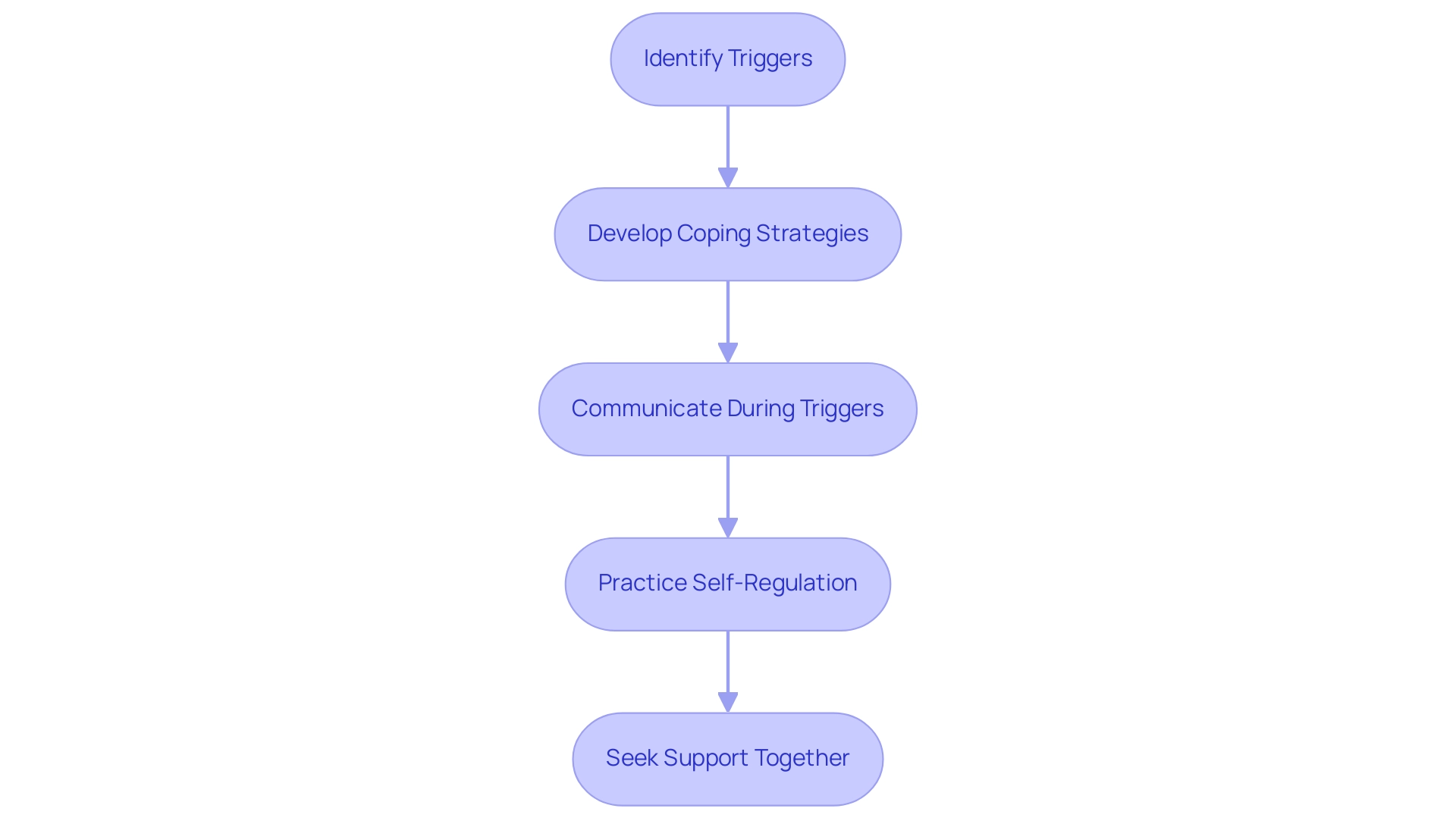
The Importance of Professional Support in Healing
Engaging with a qualified therapist is essential for both partners as they navigate the complexities of PTSD together. Professional support fosters a safe and nurturing atmosphere where each person can explore their feelings, develop effective coping strategies, and address underlying issues.
Our therapeutic services utilize:
- Hypnosis
- NLP
- Memory reconsolidation
to resolve emotional trauma, which can lead to profound personal transformation. We provide private one-on-one sessions customized to address individual needs, offering a concentrated approach to recovery.
Couples therapy, in particular, provides a unique opportunity for both individuals to express their concerns and collaboratively work towards healing. Recent findings indicate that such therapeutic approaches can significantly enhance the recovery process, fostering deeper emotional connections and understanding between partners.
Statistics show that professional support can lead to a 61% response rate and a 94% completion rate in therapy programs, underscoring its effectiveness. Methods like Accelerated Resolution Therapy (ART) and our innovative techniques have demonstrated success in helping individuals process their trauma at a deeper level.
For instance, a case study titled 'Preparing For An Art Session' highlights that individuals who approach therapy with an open mind and readiness can experience significant recovery outcomes. It is important for both individuals to support each other in seeking professional assistance as a crucial resource on their recovery journey.
As one insightful observer noted, 'Understanding the mechanism behind success stories shared by those who’ve gone through similar experiences encourages more people to take the leap of faith themselves.' This reinforces the transformative potential of seeking help and emphasizes that healing is not just possible but can also be a shared journey that strengthens the bond between partners.
If you think that psychological harm is the reason for your stress, consider contacting us for private sessions, as that is the most efficient and quick intervention.
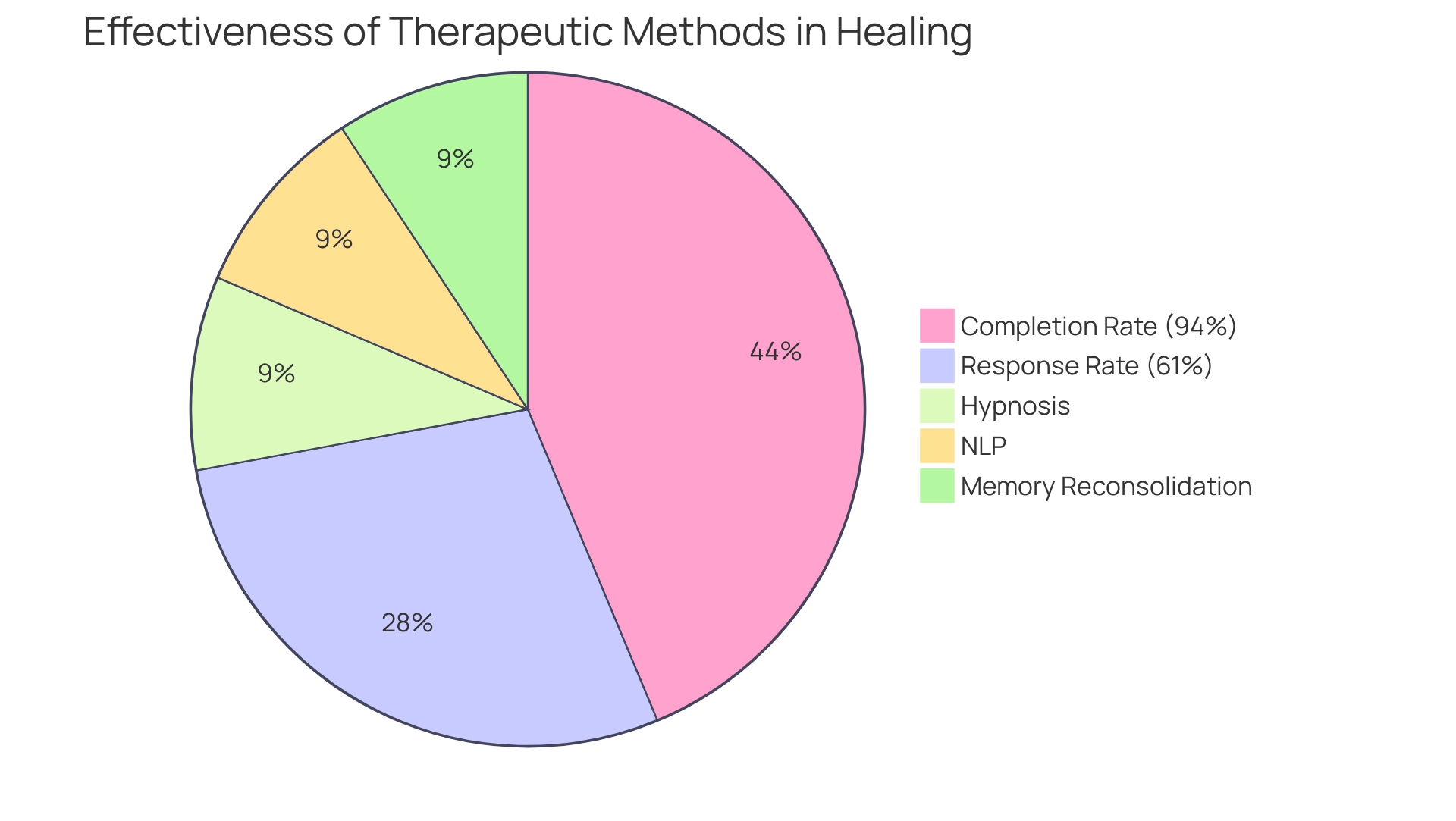
Self-Care for Partners and Family: Supporting Each Other
-
Practice Self-Compassion: It's essential to acknowledge your own feelings, allowing yourself to recognize that feeling overwhelmed at times is completely normal. Treat yourself with the same kindness and understanding you would offer to a dear friend. Remember, your well-being matters just as much as that of your loved one. Studies have shown that self-compassion can significantly improve mental health, with a notable correlation between high self-compassion levels and lower anxiety and depression rates. It’s crucial to understand that enhancing your self-esteem, self-confidence, and self-worth can directly contribute to your success in supporting those around you. Low self-esteem often stems from negative experiences and criticism, leading to feelings of inadequacy.
-
Set Aside Time for Yourself: Carve out regular moments for self-care that nourish your spirit. Whether it’s engaging in physical activities, diving into hobbies, or simply practicing relaxation techniques, these breaks can rejuvenate you and help maintain your emotional balance. According to L. Brandt, "Prioritizing self-care is not a luxury; it’s a necessity for those supporting loved ones with trauma." Embracing self-care can also improve your self-worth, leading to a more fulfilling life.
-
Engage in Open Communication: Foster an environment of honesty by sharing your feelings with your significant other or family members. Articulating your own needs and concerns is crucial, as it not only strengthens your connection but also aids in understanding each other’s feelings. This open dialogue can prevent feelings of isolation, which is often reported in case studies focusing on individuals of PTSD sufferers. Furthermore, understanding the differences between self-esteem, self-confidence, and self-worth can enhance your communication skills.
-
Seek Support Networks: Connecting with friends, family, or support groups can be incredibly helpful. Sharing your experiences with others who understand what you're going through can provide comfort and fresh perspectives. These networks can serve as a strong foundation of support during challenging times. Research indicates that individuals who engage with support networks report improved emotional resilience and coping strategies, essential for overcoming trauma-related challenges.
-
Educate Yourself About PTSD: Taking the time to learn about PTSD can significantly enhance your empathy towards your loved one’s experiences and responses. Comprehending the intricacies of trauma can aid in fostering a more supportive and nurturing atmosphere, enabling both you and your companion to traverse this journey together. Case studies have shown that partners who actively educate themselves about PTSD are better equipped to provide effective support, leading to improved relationship dynamics. Moreover, exploring options like hypnosis, including techniques such as NLP (neuro-linguistic programming) and memory reconsolidation, can pave the way for emotional healing.
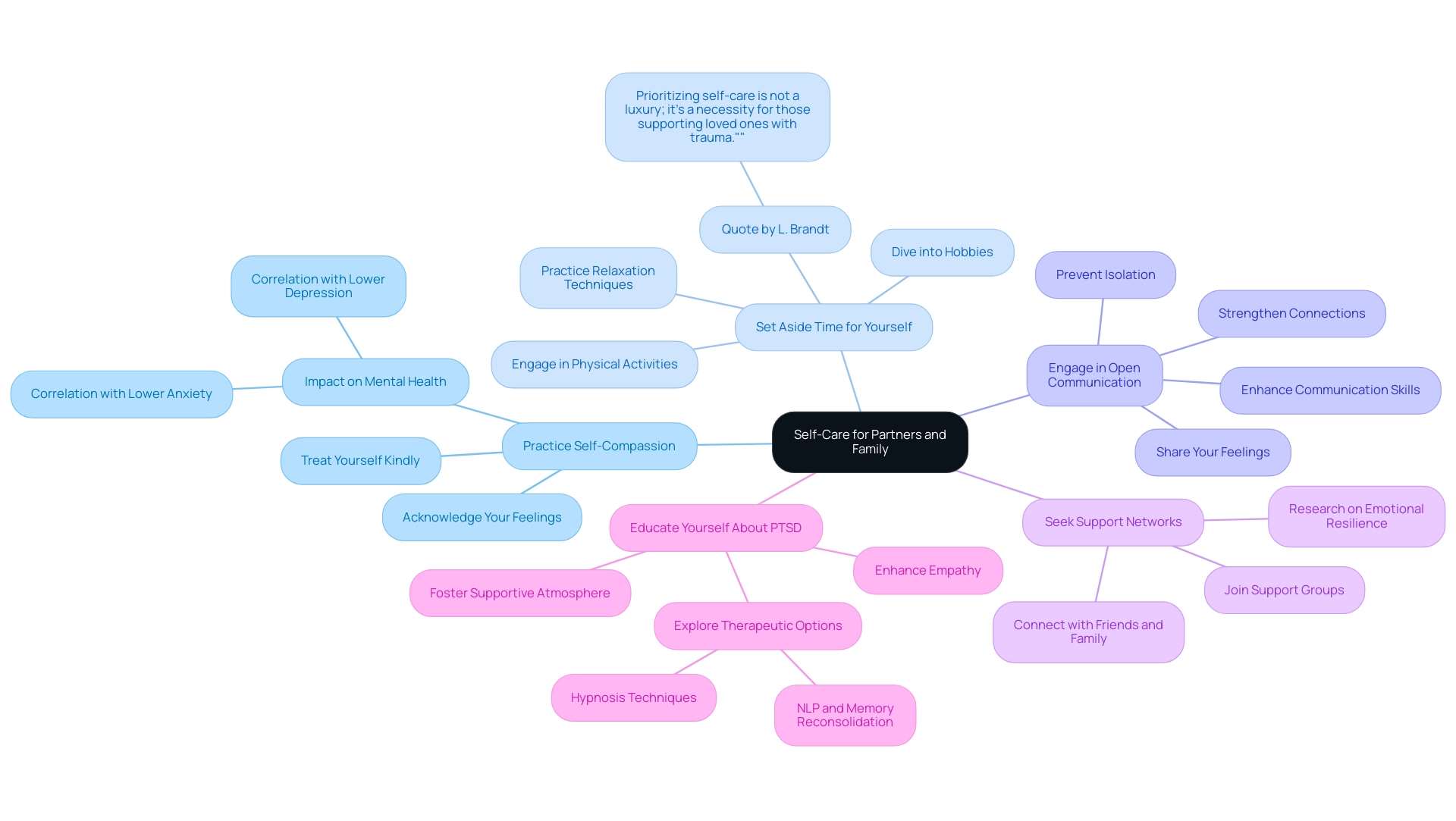
Conclusion
Navigating the challenges of a relationship impacted by PTSD requires a compassionate and informed approach. By understanding how PTSD affects communication, trust, and emotional connection, partners can foster a supportive environment conducive to healing. Open communication, setting boundaries, and practicing patience are pivotal strategies that can significantly enhance relationship satisfaction and rebuild trust.
Recognizing and managing triggers together allows couples to maintain healthy interactions, while the importance of professional support cannot be overstated. Engaging with qualified practitioners who utilize innovative methods such as hypnosis and NLP can lead to profound personal transformations and deeper emotional connections. Moreover, prioritizing self-care for both partners not only nurtures individual well-being but also strengthens the overall relationship.
Ultimately, the journey of healing from PTSD is not one that needs to be faced alone. By embracing empathy, understanding, and professional guidance, couples can navigate the complexities of trauma together, emerging with a stronger bond and renewed hope. The path to recovery is a shared journey that can lead to deeper intimacy and trust, proving that love and support can thrive even in the face of adversity.




